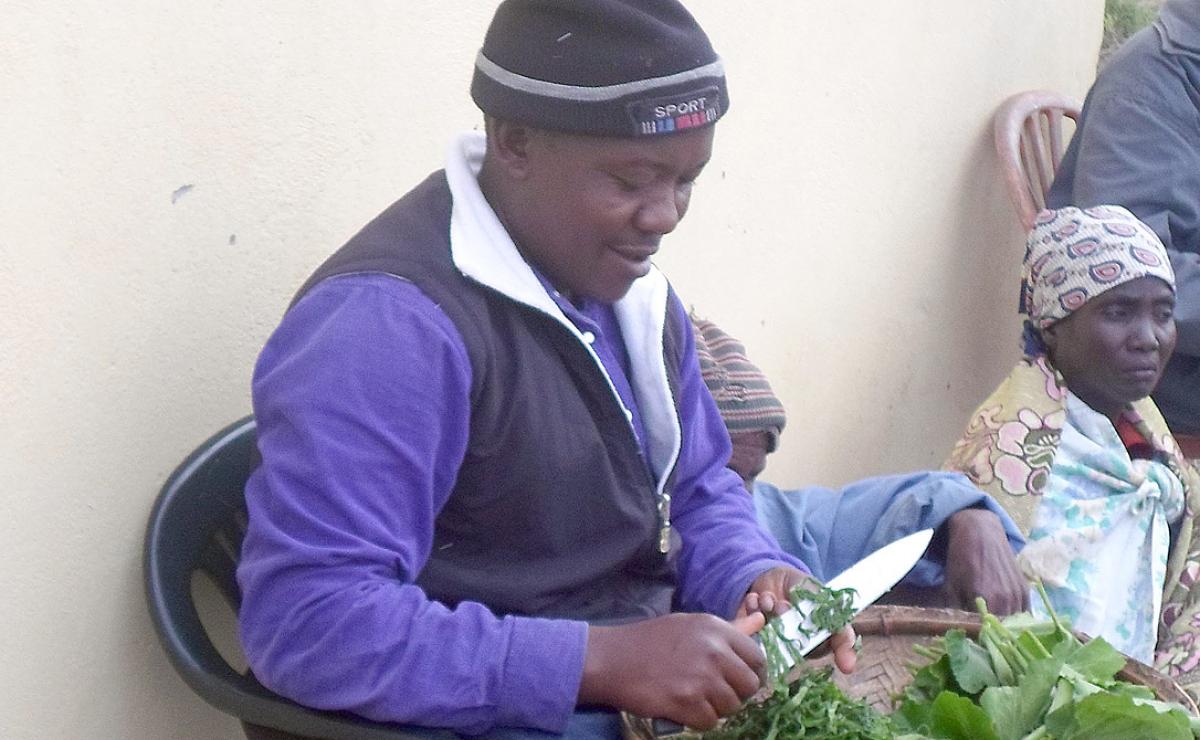Passing on Skills to Enhance Food Security in Rural Mozambique

LWF Supports Community Empowerment Projects
(LWI) – Sergio Banze is a primary school teacher in Tingonhamene village, Chokwe district, in Mozambique’s southern province of Gaza. In March this year he participated in a community-based training session on food conservation, something quite new in this rural area, which normally experiences food shortages over the dry period from August to November each year.
After the five-day training, he had learned how to conserve most of the vegetables and fruits grown on the family land—onions, cassava leaves, cabbage and tomatoes—and how to prepare jam from tomatoes, pineapples and carrots.
“Processed like this, the foodstuff can be conserved up to one year. This is a solution towards hunger reduction within households in this community during the months of scarcity,” he says of the training conducted for 25 community members by The Lutheran World Federation (LWF) program in Mozambique.
The training involves age-old practical, simple and cost-effective traditional food drying methods that are no longer commonplace, explains Constantino W. Malate, planning, monitoring and evaluation officer for the LWF Department for World Service (DWS) country program in Mozambique.
The vegetables to be dried are first washed, cut up into small pieces and spread out on a net suspended under a shade. Salt and a few onion slices are added, and the vegetables are turned every two or so hours, to ensure maximum exposure to sunlight. After about eight hours in the open, the vegetables are collected and left to air indoors. For green leaves, typically used for stews, the drying process is repeated the following day to ensure all the moisture has been extracted. They are then placed in clean, well dried bottle jars, and are ready to be stored indoors for later use. Vegetables such as carrots may require a longer drying period, Malate adds.
Animal Feed
As most households also keep small livestock and poultry, the LWF training includes skills for preparing and storing fodder for use during the dry months. The process involves storing grass and/or chopped food plants such as maize in a rectangular pit lined with plastic sheets. Small measures of salt, sugar and water are added to each consecutive layer of fodder until the hole is filled up. It is then covered with a plastic sheet and sand is poured on top to keep it dry and air tight. After three weeks, the silage is ready for animal feed. The LWF trainers teach farmers how to identify and treat common animal diseases, and take better care of their animals for milk and manure production, among other benefits.
Changing Perceptions
For Banze, who teaches Portuguese, social science, mathematics and art, the food conservation training has also been about passing on knowledge and changing perceptions about gender roles. With his newly acquired skills, he trains his students to make use of available resources to enhance the variety and availability of food at household level.
He feels honored to give students something he never had in his childhood. “I grew up seeing my mother throwing out tomatoes and green leaves during the harvest period because we could not eat all them, yet during the dry season we did not have stew for meals. Now I can confidently say that my students will face a different scenario,” he says. As the school curriculum includes food conservation as one of the topics in social science, Banze sees “this as an opportunity to teach them [students] how to improve their diet through conservation of vegetables. This is also an opportunity to equally reach boys and girls with the same message and skills,” adds the teacher, who is also a member of the Tingonhamene community development committee (CDC).
Taking part in the training was also a personal effort to influence attitudinal change. In the community, food preparation and conservation are tasks that are associated with predominantly women’s roles such as fetching water from the river or borehole, cooking, cleaning the house, and providing care for family members. That the LWF trainings involve both women and men participants in animal husbandry, has made many people realize that the strict traditional gender-based task division can be broken, notes LWF community officer Malate.
As LWF’s intervention responds to the needs identified by the community, the respective projects integrate the necessary awareness raising and ensure equal gender representation on the CDCs and in the training sessions.
The food conservation training sessions target groups of 25 male and female farmers, and the CDCs ensure monitoring among the households represented. By the end of the project cycle in 2015, LWF Mozambique expects to have trained at least 3,340 households in 24 communities in Gaza province.
Strengthening Community Support
In Nhampimbe village, a community with about 30 orphans and vulnerable children due to the HIV and AIDS pandemic and other factors, 15 vulnerable children will receive school materials such as bags, exercise books and pens from the LWF-supported savings and loans group or IR-VICOBA. The group members also act as guardians to the children, and encourage some of the older ones to engage in small-scale farming to support their families, says Emilio Bonifacio Eduardo, LWF Mozambique community development officer.
“The LWF community empowerment projects have been successful in many crucial areas that improve the lives of the rural poor, including community-based response to disaster risk reduction, improving food security and preventing diseases like malaria. It is encouraging to see an increase in the participation of women, especially in regions with a high level of illiteracy,” adds Katja José, LWF representative in Mozambique, and head of DWS work there.
(DWS project staff in Gaza and Sofala contributed to this feature story.)
